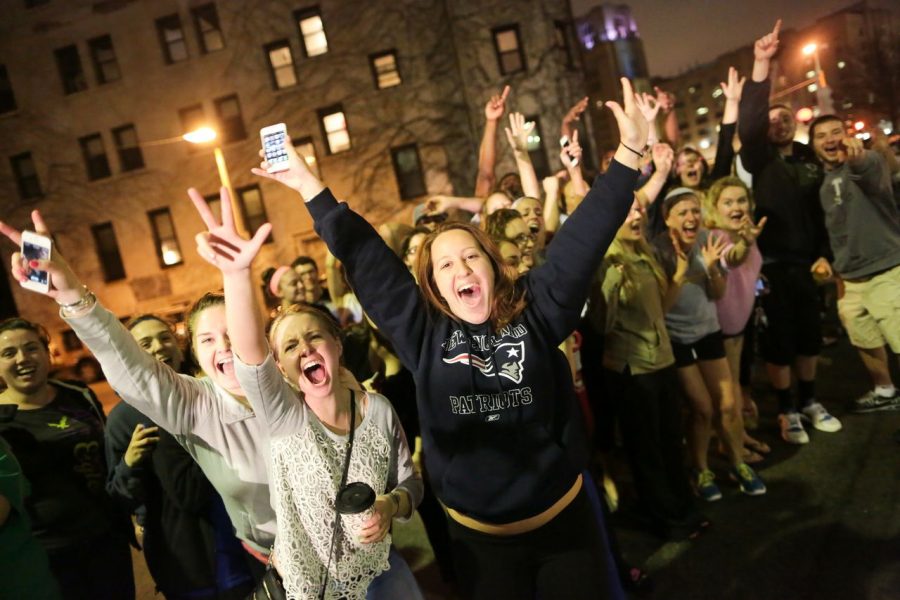On Friday April 19, after news reports that one suspect in the Boston Marathon bombings had been killed and another was captured, the media became fixated on crowds of Bostonians taking to the streets to “celebrate.”
There is nothing to celebrate. The week leading up to the capture of Dzhokhar A. Tsarnaev was a tragedy on every level. It began with the horrific bombings at the Boston Marathon killing three people, wounding over 180, and traumatizing an entire city. It finished with a gunfight that left two dead and the whole city locked down as thousands of police and military personnel conducted a massive manhunt for a 19-year-old.
A city I’ve called home for my entire life suddenly fell under siege. Boston became engulfed in a schizophrenic climate of anxiety and heartache, racism and fear, solidarity and empathy.
While a small number of (overwhelmingly white) students at private universities engaged in a grotesque display of arrogant nationalism, with little regard for the experiences of those most affected by the tragedy, I couldn’t help but think about those for whom this nightmare is nowhere close to being over, and who likely found little reason to cheer.
That’s true of the families and friends of Monday’s bombing victims and the first responders, scarred mentally and, some of them, physically. It’s also true of Arabs, Muslims, and other immigrant communities – a violent backlash that can only be described as racial terrorism has only just begun.
Victims of several hate crimes in the Boston area have already been made to pay for a crime they had nothing at all to do with, including a Latino friend of mine who was chased to his car by five white men and told to “go back home” because he looked like “a fucking sand-n***er terrorist.” Or my Muslim friend who was called a “terrorist” and told to “take off her fucking hijab.” Or a Russian friend who was told to “shut the fuck up” for speaking Russian.
While the media focused on images of white students hugging police officers, they ignored the traumatic violence that people of color and immigrant communities have already endured and will continue to for weeks and months.
While they celebrated the death of 26-year-old Tamerlan Tsarnaev at the hands of police and salivated over the manhunt for his brother, Dzhokhar Tsarnaev, by a domestic army, I found myself heartbroken. Dzhokhar is only 19. Seeing his picture, I could not stop thinking to myself that this young man could have been one of my classmates, my cousins, my younger brothers.
The fact that anyone could be driven to make such horrible decisions, and at such young ages, that would ruin their lives and the lives of so many others is nothing short of tragic. Recognizing this does not mean disrespecting the victims of Monday’s bombings, but rather, it is the starting point for seriously addressing the issues which drove them to commit such heinous crimes.
Meanwhile, the corporate media was filled with never-ending praise for the thousands of police and federal law enforcement that turned the city into an armed camp. Seeing heavily armed police at every train station and SWAT tanks driving through the streets of Boston was more like images from occupied Iraq or checkpoints in Gaza than my own reality.
All of a sudden, everyone from CNN reporters to Governor Deval Patrick to President Barack Obama wanted us to believe that the same police who terrorize and incarcerate poor communities of color on a daily basis and brutally repressed the Occupy movement a little over a year ago, would now keep Bostonians safe.
I couldn’t buy it. Not once did the media question whether the increasing militarization of the police, the constant expansion of the surveillance state, the continuing erosion of basic civil liberties and the billions in taxpayer dollars spent on all of this really work to make people safer. It may not be popular to say, but none of this prevented the bombing in the first place, and it did little to keep people safe as the manhunt and confrontation took place later in the week.
Instead of feeling elated, I’m deeply concerned that the government will do what it’s proven itself much better at: exploiting tragedy to justify increasing the national security state to control dissent and further terrorize already marginalized and targeted communities.
We live in a society permeated by violence. That violence, whether inflicted domestically or abroad, is perpetuated by society’s most powerful institutions.
If we hope to live in a world of peace, where no one will experience the nightmare of this past week, then we need to reject militarizing the police, mass incarceration, enlarging the security state, and demonizing Arabs and Muslims. Instead, we need to start addressing the social roots of what causes violence in our world.

